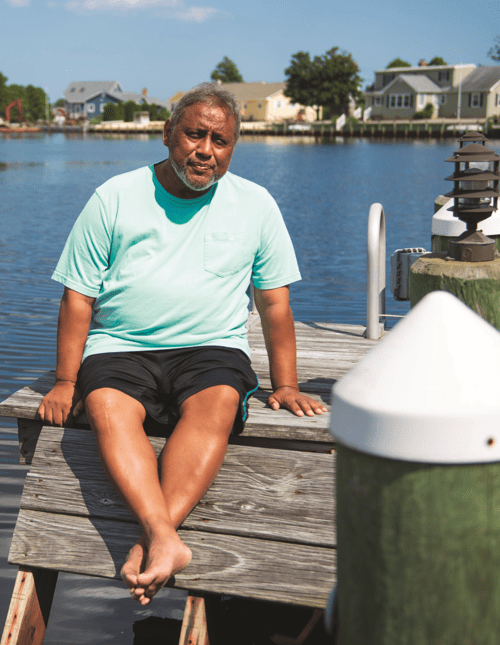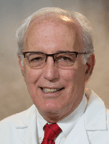"I was surprised about being a man with breast cancer. I looked at Dr. Schulman and said, ‘Are you kidding me?’”

In the summer of 2018, John Aviles, 65, of Forked River noticed a lump in his right breast. He saw the nurse practitioner in his doctor’s office, and she recommended that he have a mammogram, which revealed a suspicious mass.
John made an appointment with Community Medical Center (CMC) breast surgeon William Schulman, MD, who noticed there was a hard, palpable mass in John’s right breast. There was also a swollen lymph node under his right arm. Dr. Schulman ordered a core biopsy of the mass and lymph node, and the test revealed that John had breast cancer.
“It took me by surprise,” recalls John. “I worked out regularly and was healthy. Also, I was surprised about being a man with breast cancer. I looked at Dr. Schulman and said, ‘Are you kidding me?’”
Breast cancer is uncommon in men. “For every 100 women with breast cancer, we see one man with the disease,” says Dr. Schulman. “Many men don’t realize they can get breast cancer. As a result, it’s often identified at a later stage.”
Dr. Schulman recommended that John undergo testing to determine whether he had any genetic mutations that would predispose him to breast cancer. “If he had one of the mutations, there was a chance he could pass the gene on to one of his children,” says Dr. Schulman. It turns out he didn’t carry any of the mutations.

An Aggressive Treatment Plan
The breast biopsy showed that John had locally advanced ductal carcinoma, and the tumor was hormonally sensitive. “I suggested that John have a right modified radical mastectomy, in which we remove the breast tissue and lymph nodes,” says Dr. Schulman.
John was anxious to proceed with treatment. “I thought, ‘Let’s take care of this,’” he recalls. “I don’t want to reduce my life expectancy.” John’s son and his wife were expecting a baby, who would be his first grandchild.
In October 2018, Dr. Schulman removed John’s right breast and 17 nearby lymph nodes. “John did well with the surgery,” says Dr. Schulman. “He had some swelling in his right arm, but he had good strength and use of the arm.”
John recalls that “the nurses were very attentive.”
The pathology report showed that six lymph nodes were cancerous. The cancer was considered Stage 3A, says Dr. Schulman.
John began chemotherapy in November 2018. “It knocked me for a loop,” he recalls. He needed six sessions each of two different chemotherapy drugs. “The nurses always made sure I was comfortable with food and drinks,” he says.
In May 2019, John started radiation therapy. He needed daily treatments for more than a month. When the treatment was complete, he began taking tamoxifen, a medication that can help prevent a recurrence of breast cancer. He will take the drug for five years.
In addition, John was invited to participate in a clinical trial, which is investigating aspirin’s effect on cancer. As part of the trial, he takes medication daily. He doesn’t know if it’s aspirin or a placebo, but “I might benefit,” he says.
After his treatment was completed, John had a CT scan, which showed that he’s cancer-free. Three to four times per year, John sees Dr. Schulman so he can check the site of the mastectomy, his lymph nodes, and the opposite breast.
Starting next year, he will see Dr. Schulman once every six months. John also follows up with his medical oncologist, Chirag Shah, MD, and radiation oncologist, Rajesh Iyer, MD, on a regular basis.
Today, John is back to hiking five to six miles on a regular basis. “I feel great,” he says. “I had a very good treatment team at CMC.” John is grateful to be able to spend time with his 15-month-old grandson. “It was worth it to go through the treatment,” he says.
A Personalized Approach to Care
At Community Medical Center (CMC), physicians use a multidisciplinary approach to care for patients. A breast tumor board composed of surgeons, medical oncologists, radiation oncologists, radiologists, pathologists, geneticists and occupational therapists meets twice a month to discuss each patient.
“We make treatment recommendations based on national guidelines and a patient’s age, stage of disease, well-being and wishes to give them the best chance for a cure,” says Dr. Schulman.
Signs of Breast Cancer in Men
Men, like women, should be aware of their bodies and examine their breasts regularly, says William Schulman, MD, a breast surgeon at CMC. They should watch for the following signs of breast cancer and report any concerns to their doctor.
- A lump or swelling in the breast, which can be painless
- Skin dimpling or puckering
- Nipple changes, such as “retraction,” or turning inward
- Nipple discharge
- Redness or scaling of the nipple or breast skin
RWJBarnabas Health and Community Medical Center, in partnership with Rutgers Cancer Institute of New Jersey—the state’s only NCI-Designated Comprehensive Cancer Center—provide close-to-home access to the most advanced treatment options. For more information, visit our Cancer page. To schedule an appointment, call 844.CANCERNJ.